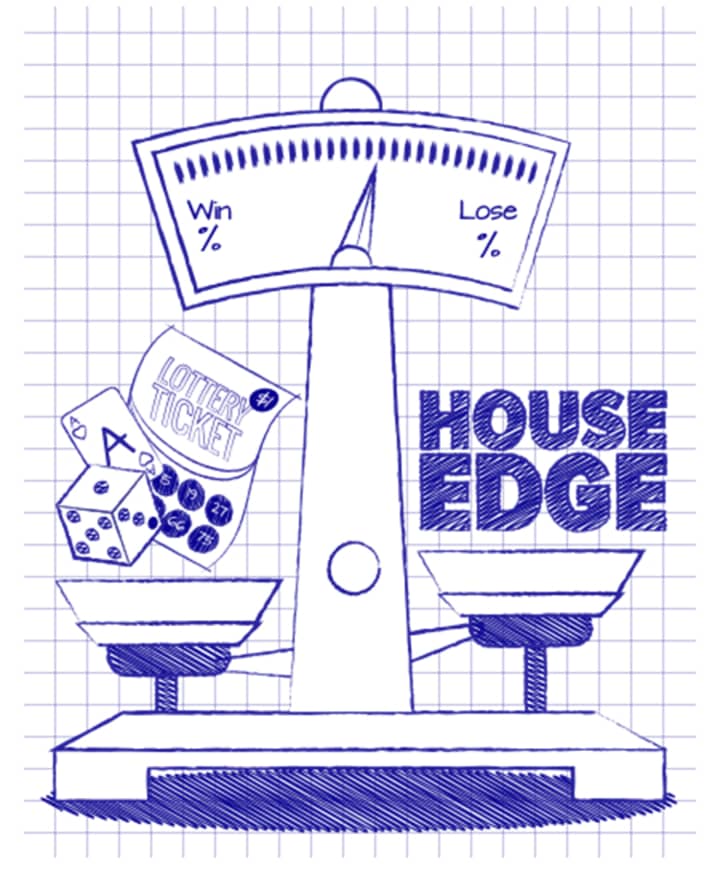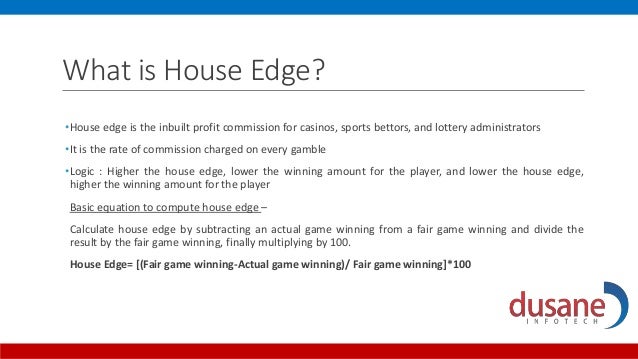Casino House Edge
- The house edge is commonly understood as the percentage of total initial player wagers the casino expects to earn over the long run if all players use perfect strategy against the game. For those games that have exactly one wagering opportunity, the house edge refers to the edge for that wager.
- The house edge is also known as the casino advantage. And it's something that exists on every table game, lotto, or slot in a casino online or on land. House edge tells you: How much each game pays.
- Casino House Edge Casinos are a place where adults can have as much fun as kids do at amusement parks. This could not be any more of an apt description because amusement parks and casinos are exactly the same—they both take as much money as they can from you and still manage to send you home happy.
- House edge is the statistical percentage of the edge that the casino has in any given situation. Some games and activities have a fixed advantage, and some have a variable edge that changes depending on a past event and the player’s strategy. Here is an example: When you play baccarat and bet on the banker’s hand, the casino house edge is.
The house edge on a 00 roulette wheel is 5.26%. For every $1 million that's bet at the roulette tables in a casino, the management expects to pocket a profit of slightly more than $50,000.
Most players go to the casino with a favorite game in mind and will play it regardless of its house edge. This is not the best play. The main goal of gambling is to win. The correct action is to play the games with the highest chances of winning, even if you’re on a budget.
Blackjack


The game with the lowest house edge in a casino is usually blackjack. There are rules that may change the return of blackjack from one casino to another. The most important rule in a blackjack game is that it pays 3-2 on blackjack. If the table pays 6-5 on a natural, keep walking.
It is also important for the blackjack game to allow double down on any two cards and after splitting. Other rules that benefit players include permitting surrender and resplitting aces. It is also best to find blackjack tables where the dealer stays on all 17’s.


Craps
Craps is often the best or second best game in a casino. The higher the odds allowed, the lower the house edge. That is because there is no house edge on an odds bet at a craps game. It theoretically returns 100% to the player. The best bet on the craps table to start a roll is the Don’t Pass. Don’t Come is the identical bet and has the same edge, but is only available after the come out roll. The Pass Line is the second best bet. The Come offers identical odds for rolls after the come out.
Placing numbers is the next best bets at a craps table. The Field is reasonable as long as 12 pays triple. Most of the other wagers at a craps table are sucker bets. The closer you get to the middle of the table, the higher the house edge.
Ultimate Texas Hold’em
Ultimate Texas Hold’em is a complex game with a surprisingly low house edge. The game is based on Texas Hold’em where players are up against only the dealer. Players receive 99.6% returned on average.
Video Poker
Video poker can be a great game. Depending on the pay table, it may be the best in the casino. Some casinos offer better video poker than others. Check out VPFree2.com to find the best video poker in your local casino. It may offer a better return than blackjack or any other table game. Make sure to always wager five coins and learn basic strategy.
Worst Casino Games to Play
Some casino games should never be played. This is due to the massive house edge or speed of the game. The games below are among the worst in any casino.
Big Six Wheel
The Big Six Wheel is the worst table game in a casino. The best bet has a house edge of 11%. The worst long shot bets have a 24% edge. This game is often found at the entrance of the casino. Keep walking past it.
Double Zero Roulette
Double Zero Roulette is often referred to as American Roulette. That is because you will not find the game in most other countries. The game has a 5.26% house edge on all but one bet on the wheel. The other bet, one that is impossible on a single zero wheel, has a 7.89% edge. A player that wagers $10 per spin will lose $31 an hour on average.
Casino War
The house edge on Casino War is 2.9%. That is not terrible by itself. The problem lies in that over 500 hands per hour can be played. This means that players can lose 15 bets per hour at the Casino War table. The house edge on the tie side bet is nearly 20%. If you must play this game, make sure to at least avoid that sucker bet.
Slots
Slots are the most popular game in the casino. The edge on most penny slots is 10%. Considering the hundreds of spins a player can make per game, this adds up fast. If you must play slots, choose the old reel-style games for $1 or higher. It will cut the house edge by at least half.

Mississippi Stud and Caribbean Stud
Mississippi Stud is a newer carnival game. It requires players to place as many as four bets. The edge on this game is 5% with wild variance. Caribbean Stud deserves an honorable mention as its edge and variance are nearly identical. Players looking to play poker table games should learn Ultimate Texas Hold’em.
Related Posts:
Introduction
The house edge is defined as the ratio of the average loss to the initial bet. In some games the beginning wager is not necessarily the ending wager. For example in blackjack, let it ride, and Caribbean stud poker, the player may increase their bet when the odds favor doing so. In these cases the additional money wagered is not figured into the denominator for the purpose of determining the house edge, thus increasing the measure of risk. For games like Ultimate Texas Hold 'Em and Crazy 4 Poker, where there are two required initial wagers, the house edge is based on one of them only. House edge figures are based on optimal or near-optimal player strategy.
The table below shows the house edge of most popular casino games and bets.
Casino Game House Edge
| Game | Bet/Rules | House Edge | Standard Deviation |
|---|---|---|---|
| Baccarat | Banker | 1.06% | 0.93 |
| Player | 1.24% | 0.95 | |
| Tie | 14.36% | 2.64 | |
| Big Six | $1 | 11.11% | 0.99 |
| $2 | 16.67% | 1.34 | |
| $5 | 22.22% | 2.02 | |
| $10 | 18.52% | 2.88 | |
| $20 | 22.22% | 3.97 | |
| Joker/Logo | 24.07% | 5.35 | |
| Bonus Six | No insurance | 10.42% | 5.79 |
| With insurance | 23.83% | 6.51 | |
| Blackjacka | Liberal Vegas rules | 0.28% | 1.15 |
| Caribbean Stud Poker | 5.22% | 2.24 | |
| Casino War | Go to war on ties | 2.88% | 1.05 |
| Surrender on ties | 3.70% | 0.94 | |
| Bet on tie | 18.65% | 8.32 | |
| Catch a Wave | 0.50% | d | |
| Craps | Pass/Come | 1.41% | 1.00 |
| Don't pass/don't come | 1.36% | 0.99 | |
| Odds — 4 or 10 | 0.00% | 1.41 | |
| Odds — 5 or 9 | 0.00% | 1.22 | |
| Odds — 6 or 8 | 0.00% | 1.10 | |
| Field (2:1 on 12) | 5.56% | 1.08 | |
| Field (3:1 on 12) | 2.78% | 1.14 | |
| Any craps | 11.11% | 2.51 | |
| Big 6,8 | 9.09% | 1.00 | |
| Hard 4,10 | 11.11% | 2.51 | |
| Hard 6,8 | 9.09% | 2.87 | |
| Place 6,8 | 1.52% | 1.08 | |
| Place 5,9 | 4.00% | 1.18 | |
| Place 4,10 | 6.67% | 1.32 | |
| Place (to lose) 4,10 | 3.03% | 0.69 | |
| 2, 12, & all hard hops | 13.89% | 5.09 | |
| 3, 11, & all easy hops | 11.11% | 3.66 | |
| Any seven | 16.67% | 1.86 | |
| Crazy 4 Poker | Ante | 3.42%* | 3.13* |
| Double Down Stud | 2.67% | 2.97 | |
| Heads Up Hold 'Em | Blind pay table #1 (500-50-10-8-5) | 2.36% | 4.56 |
| Keno | 25%-29% | 1.30-46.04 | |
| Let it Ride | 3.51% | 5.17 | |
| Pai Gowc | 1.50% | 0.75 | |
| Pai Gow Pokerc | 1.46% | 0.75 | |
| Pick ’em Poker | 0% - 10% | 3.87 | |
| Red Dog | Six decks | 2.80% | 1.60 |
| Roulette | Single Zero | 2.70% | e |
| Double Zero | 5.26% | e | |
| Sic-Bo | 2.78%-33.33% | e | |
| Slot Machines | 2%-15%f | 8.74g | |
| Spanish 21 | Dealer hits soft 17 | 0.76% | d |
| Dealer stands on soft 17 | 0.40% | d | |
| Super Fun 21 | 0.94% | d | |
| Three Card Poker | Pairplus | 7.28% | 2.85 |
| Ante & play | 3.37% | 1.64 | |
| Ultimate Texas Hold 'Em | Ante | 2.19% | 4.94 |
| Video Poker | Jacks or Better (Full Pay) | 0.46% | 4.42 |
| Wild Hold ’em Fold ’em | 6.86% | d |
Notes
| a | Liberal Vegas Strip rules: Dealer stands on soft 17, player may double on any two cards, player may double after splitting, resplit aces, late surrender. |
| b | Las Vegas single deck rules are dealer hits on soft 17, player may double on any two cards, player may not double after splitting, one card to split aces, no surrender. |
| c | Assuming player plays the house way, playing one on one against dealer, and half of bets made are as banker. |
| d | Yet to be determined. |
| e | Standard deviation depends on bet made. |
| f | Slot machine range is based on available returns from a major manufacturer |
| g | Slot machine standard deviation based on just one machine. While this can vary, the standard deviation on slot machines are very high. |
Guide to House Edge
The reason that the house edge is relative to the original wager, not the average wager, is that it makes it easier for the player to estimate how much they will lose. For example if a player knows the house edge in blackjack is 0.6% he can assume that for every $10 wager original wager he makes he will lose 6 cents on the average. Most players are not going to know how much their average wager will be in games like blackjack relative to the original wager, thus any statistic based on the average wager would be difficult to apply to real life questions.
The conventional definition can be helpful for players determine how much it will cost them to play, given the information they already know. However the statistic is very biased as a measure of risk. In Caribbean stud poker, for example, the house edge is 5.22%, which is close to that of double zero roulette at 5.26%. However the ratio of average money lost to average money wagered in Caribbean stud is only 2.56%. The player only looking at the house edge may be indifferent between roulette and Caribbean stud poker, based only the house edge. If one wants to compare one game against another I believe it is better to look at the ratio of money lost to money wagered, which would show Caribbean stud poker to be a much better gamble than roulette.
Many other sources do not count ties in the house edge calculation, especially for the Don’t Pass bet in craps and the banker and player bets in baccarat. The rationale is that if a bet isn’t resolved then it should be ignored. I personally opt to include ties although I respect the other definition.
Element of Risk
For purposes of comparing one game to another I would like to propose a different measurement of risk, which I call the 'element of risk.' This measurement is defined as the average loss divided by total money bet. For bets in which the initial bet is always the final bet there would be no difference between this statistic and the house edge. Bets in which there is a difference are listed below.
Element of Risk
| Game | Bet | House Edge | Element of Risk |
|---|---|---|---|
| Blackjack | Atlantic City rules | 0.43% | 0.38% |
| Bonus 6 | No insurance | 10.42% | 5.41% |
| Bonus 6 | With insurance | 23.83% | 6.42% |
| Caribbean Stud Poker | 5.22% | 2.56% | |
| Casino War | Go to war on ties | 2.88% | 2.68% |
| Crazy 4 Poker | Standard rules | 3.42%* | 1.09% |
| Heads Up Hold 'Em | Pay Table #1 (500-50-10-8-5) | 2.36% | 0.64% |
| Double Down Stud | 2.67% | 2.13% | |
| Let it Ride | 3.51% | 2.85% | |
| Spanish 21 | Dealer hits soft 17 | 0.76% | 0.65% |
| Spanish 21 | Dealer stands on soft 17 | 0.40% | 0.30% |
| Three Card Poker | Ante & play | 3.37% | 2.01% |
| Ultimate Texas Hold 'Em | 2.19%* | 0.53% | |
| Wild Hold ’em Fold ’em | 6.86% | 3.23% |
Standard Deviation
The standard deviation is a measure of how volatile your bankroll will be playing a given game. This statistic is commonly used to calculate the probability that the end result of a session of a defined number of bets will be within certain bounds.
The standard deviation of the final result over n bets is the product of the standard deviation for one bet (see table) and the square root of the number of initial bets made in the session. This assumes that all bets made are of equal size. The probability that the session outcome will be within one standard deviation is 68.26%. The probability that the session outcome will be within two standard deviations is 95.46%. The probability that the session outcome will be within three standard deviations is 99.74%. The following table shows the probability that a session outcome will come within various numbers of standard deviations.
House Edge In Casino Games
I realize that this explanation may not make much sense to someone who is not well versed in the basics of statistics. If this is the case I would recommend enriching yourself with a good introductory statistics book.
Standard Deviation
| Number | Probability |
|---|---|
| 0.25 | 0.1974 |
| 0.50 | 0.3830 |
| 0.75 | 0.5468 |
| 1.00 | 0.6826 |
| 1.25 | 0.7888 |
| 1.50 | 0.8664 |
| 1.75 | 0.9198 |
| 2.00 | 0.9546 |
| 2.25 | 0.9756 |
| 2.50 | 0.9876 |
| 2.75 | 0.9940 |
| 3.00 | 0.9974 |
| 3.25 | 0.9988 |
| 3.50 | 0.9996 |
| 3.75 | 0.9998 |
Hold
Although I do not mention hold percentages on my site the term is worth defining because it comes up a lot. The hold percentage is the ratio of chips the casino keeps to the total chips sold. This is generally measured over an entire shift. For example if blackjack table x takes in $1000 in the drop box and of the $1000 in chips sold the table keeps $300 of them (players walked away with the other $700) then the game's hold is 30%. If every player loses their entire purchase of chips then the hold will be 100%. It is possible for the hold to exceed 100% if players carry to the table chips purchased at another table. A mathematician alone can not determine the hold because it depends on how long the player will sit at the table and the same money circulates back and forth. There is a lot of confusion between the house edge and hold, especially among casino personnel.
Casino Games House Edge
Hands per Hour, House Edge for Comp Purposes
The following table shows the average hands per hour and the house edge for comp purposes various games. The house edge figures are higher than those above, because the above figures assume optimal strategy, and those below reflect player errors and average type of bet made. This table was given to me anonymously by an executive with a major Strip casino and is used for rating players.
Hands per Hour and Average House Edge
| Games | Hands/Hour | House Edge |
|---|---|---|
| Baccarat | 72 | 1.2% |
| Blackjack | 70 | 0.75% |
| Big Six | 10 | 15.53% |
| Craps | 48 | 1.58% |
| Car. Stud | 50 | 1.46% |
| Let It Ride | 52 | 2.4% |
| Mini-Baccarat | 72 | 1.2% |
| Midi-Baccarat | 72 | 1.2% |
| Pai Gow | 30 | 1.65% |
| Pai Pow Poker | 34 | 1.96% |
| Roulette | 38 | 5.26% |
| Single 0 Roulette | 35 | 2.59% |
| Casino War | 65 | 2.87% |
| Spanish 21 | 75 | 2.2% |
| Sic Bo | 45 | 8% |
| 3 Way Action | 70 | 2.2% |
Footnotes
* — House edge based on Ante bet only as opposed to all mandatory wagers (for example the Blind in Ultimate Texas Hold 'Em and the Super Bonus in Crazy 4 Poker.
Casino House Edge Games
Translation
A Spanish translation of this page is available at www.eldropbox.com.